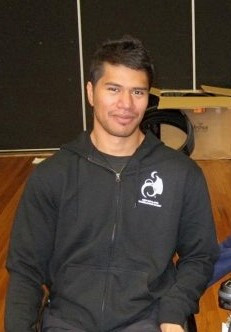Updating current informational resources to address spiritual and mental wellbeing could help Pasifika people’s recovery from spinal cord injuries, according to a HRC-funded study by AUT University student Tainafi Lefono.
Tainafi’s four-month study, part of a 2014 HRC Pacific Health Research Summer Studentship, examined the informational materials that are routinely given to patients at New Zealand’s spinal units following a spinal cord injury (SCI). He found that these materials were missing culturally relevant information in some key areas that could aid the recovery of Pasifika patients.
“My analysis revealed the absence of a Pasifika model of health that incorporates the physical, mental and spiritual facets of a Pasifika person, and clear guidance on where to seek specific cultural support if required,” says Tainafi.
SCI involves lifelong neurological impairment, which is correlated with disabilities that affect not just mobility and sensation, but also other areas such as sexual function, body temperature regulation, and bowel and bladder function. New Zealand has one of the highest rates of SCI in the western world, with Pasifika peoples at increased risk.
As part of his study, Tainafi analysed four qualitative interviews1 with Pasifika peoples who had experienced a SCI. Extracts from the interviews were grouped into categories related to the definition of culture2. He identified five key factors that contribute to the recovery of Pasifika peoples with a SCI. These are:
- Change in roles within the family and community – changes in these roles as a result of SCI affected both male and female participants
- Seeing disabled people as able – more community education about SCI may help challenge preconceived ideas of disability in cultural communities
- Opportunities for work and study post-injury – the change to work or study post-SCI, whether returning to pre-injury work or pursuing something entirely new, was important for Pasifika participants
- Spirituality and mental wellbeing – this was very important to Pasifika participants, who expressed a sense of loss of control and self-confidence due to their SCI
- Family and peer support – participants described family and peer support from other spinal-injured individuals as vital to their recovery
“Injury and disability affected all the participants in different areas of their lives,” says Tainafi. “Many talked about the debilitating effect SCI had on their wellbeing. From a cultural lens, it was clear that areas beyond physical functioning, such as mental and spiritual wellbeing, were just as important for Pasifika people’s recovery.”
Tainafi says the findings could present some challenges for healthcare services due to the differences between Pacific and New Zealand cultures.
“This is important as culture can often be a barrier to Pasifika peoples acquiring healthcare and understanding the implications of injuries or conditions on themselves and their families.”
Tainafi presented the preliminary findings of this study at the Le Va Growing Pacific Solutions Health and Disability Conference earlier this year, and will provide a summary of the findings to the Auckland and Christchurch spinal units involved and to the Accident Compensation Corporation. He also plans to present the findings at the HRC’s International Pacific Health Conference in November.
“I believe that having a spinal cord injury and being Pasifika has provided me with deep insight into this topic. However, this project has also given me much back in terms of what I’ve learned about Pacific health and the importance of culture,” says Tainafi.
* Tainafi’s study was supervised by AUT University researchers Dr Alice Theadom and Dr Joanna Fadyl, in collaboration with Professor Kathryn McPherson.
1These interviews were undertaken as part of a larger research study conducted in 2010. See Fadyl, J K, McPherson, K M (2010). Understanding decisions about work after spinal cord injury. Journal of Occupational Rehabilitation, 20(1), 69–80.
2 Definition of culture as used in Macpherson, C, Macpherson, L (1990). Samoan Medical Belief and Practice. Auckland, New Zealand: Auckland University Press.
